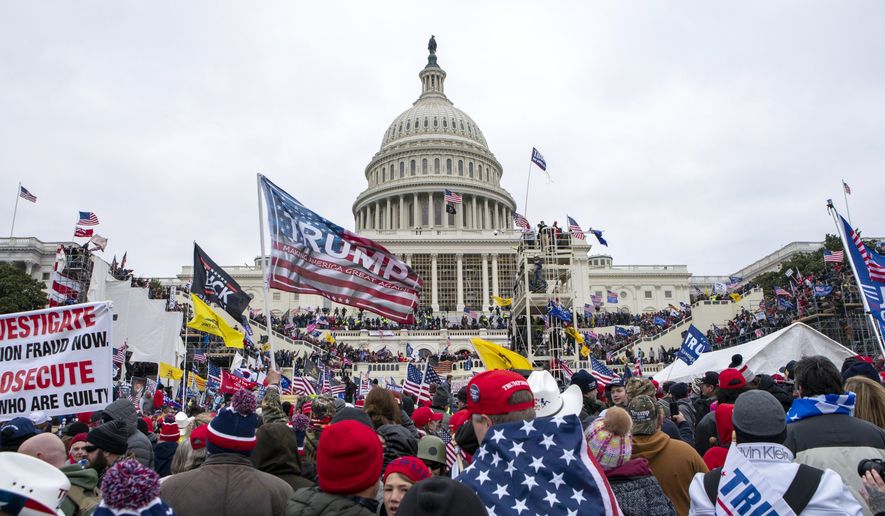People prosecuted for low-level felonies and misdemeanors such as trespassing and disorderly conduct for their involvement in the Jan. 6, 2021, storming of the U.S. Capitol say they have been blacklisted by banks and shut out of social media fundraising services.
These defendants say they have been treated like “domestic terrorists” despite convictions of relatively low-level crimes. What’s more, an attorney for defendants blames the FBI and Justice Department for prodding financial institutions to treat them like domestic terrorists.
Derrick Evans, a former West Virginia lawmaker who served three months in prison for one felony count of civil disorder, said JPMorgan Chase & Co. shut down his accounts after giving him a terrifying ultimatum. The bank sent him letters telling him that he and his wife had 30 days to empty their accounts before Chase closed the accounts.
“Getting de-banked is one of the worst experiences a person could go through. All of your auto payments cease, and you are scrambling to find a new bank so you can rejoin society,” Mr. Evans told The Washington Times.
Chase would not comment when The Times inquired about closing Mr. Evans’ accounts.
A dozen Jan. 6 defendants interviewed by The Times said they experienced similar de-banking by financial institutions, payment processing services and crowdfunding platforms.
PNC Bank said: “PNC cooperates with inquiries from law enforcement agencies in full compliance with the law, without regard to political affiliation.”
The Times contacted more than a dozen banks and online financial services. None would discuss specific cases of closing the account of a Jan. 6 defendant.
Several banks said they shut down accounts because of perceived risks. When asked about the treatment of the Jan. 6 defendants compared with people convicted of similar crimes, the banks said terminations of customer accounts were never based on political considerations.
“Consistent with laws and regulations, all U.S. banks are required to review information about their customers on an ongoing basis. And at times banks, including USAA FSB, close accounts due to identified risks. Doing so is consistent with USAA FSB’s customer agreements,” USAA Federal Savings Bank said.
The crowdfunding platform GoFundMe described its decision to blacklist some Jan. 6 defendants this way:
“GoFundMe will remove fundraisers that attempt to spread misinformation about the election, promote conspiracy theories and contribute to or participate in attacks on U.S. democracy.”
Carolyn Stewart, a lawyer who represents several Jan. 6 defendants, said she thinks the FBI and Justice Department are labeling them “domestic terrorists” and sending subpoenas and requests for information to banks, prompting the financial institutions to freeze out Jan. 6 defendants regardless of the nature of their crimes.
“I have no idea under what authority they’re doing this other than to deliberately bankrupt and trash these people,” Ms. Stewart said. “The DOJ uses the grand jury to go out and send subpoenas everywhere, even if the person doesn’t even have any” accounts with some businesses.
When The Times inquired about the FBI’s contact with financial institutions regarding Jan. 6 defendants, the FBI said it does not comment on ongoing investigations.
As previously reported by The Times, whistleblowers inside the bureau said FBI supervisors forced agents to fabricate terrorism cases to pump performance statistics and attain quotas set for domestic terrorism cases.
This was confirmed by an audit by the Justice Department’s inspector general last year. It found that the FBI used the arrests of Jan. 6 defendants to count as “terrorist disruptions” to help make the quota, which the bureau failed to do in fiscal 2022.
Brandon Straka, a former liberal Democrat who made a public break from the party and founded the #WALKAWAY campaign, said he has been banned virtually everywhere online for his involvement in the Jan. 6 riot.
He was sentenced to three years of probation in January 2022 on one misdemeanor count of disorderly conduct.
“I’m permanently banned for the rest of my life from being able to use PayPal, Venmo, Stripe, Patreon, Constant Contact, MailChimp, Facebook and Instagram. I mean, every aspect of my [life] including for my businesses,” Mr. Straka said at the recent Conservative Political Action Conference outside Washington.
He later shared a letter from a payment processor that informed him he was de-banked. “Unfortunately, we’re going to have to decline based off of [Mr. Straka’s] involvement and subsequent convictions surrounding the January 6 Capital riots,” the letter said.
Jan. 6 defendant John Strand said PayPal banned him from using the payment service.
“I repeatedly tried to appeal [the ban], and it was clear that was never going to happen. I gave up a long time ago,” he said.
Strand said he was also banned from the employment-focused social media platform LinkedIn.
“LinkedIn is not a financial one, but it’s kind of interesting because it’s inherently tied to employment,” he said.
PayPal and LinkedIn did not respond to requests for comment.
Strand is awaiting sentencing after a D.C. jury found him guilty of felony obstruction of an official proceeding and four nonviolent misdemeanors. He is facing a maximum of 24 years in prison.
With at least 1,000 people arrested on charges related to the riot at the Capitol, about 518 have pleaded guilty to a variety of federal charges. Many faced or will face incarceration at sentencing, according to the Department of Justice.
Roughly 133 have pleaded guilty to felonies, but most — 385 — pleaded guilty to misdemeanors.
A total of 60 of the guilty pleas to felonies were for the federal charge of assaulting law enforcement officers, and 26 pleaded guilty to feloniously obstructing, impeding or interfering with a law enforcement officer during a civil disorder. The most serious charge related to the riot has been the charge of seditious conspiracy. Four people have been convicted of that charge thus far.
• Kerry Picket can be reached at kpicket@washingtontimes.com.




Please read our comment policy before commenting.